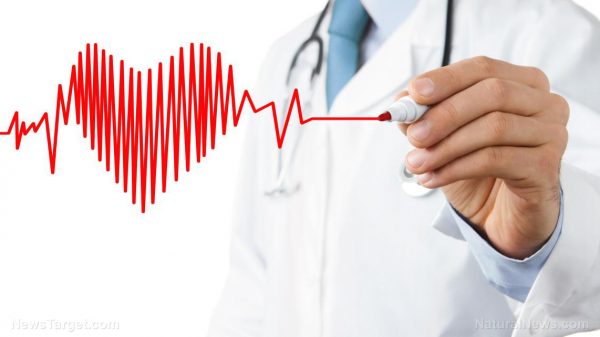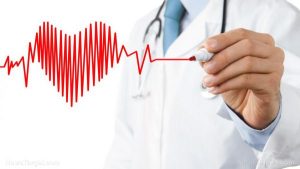
Reentrant tachycardia – causes, side effects and treatments at NaturalPedia.com
Wednesday, July 18, 2018 by Michelle Simmons
http://www.naturalpedia.com/reentrant-tachycardia-causes-side-effects-and-treatments-at-naturalpedia-com.html

Reentrant tachycardia or atrioventricular nodal reentrant tachycardia (AVNRT) is a common type of reentrant supraventricular tachycardia, which is characterized by an abnormally fast heartbeat. This occurs when the electrical impulses that coordinate the heartbeats do not work properly.
The cause of tachycardia, in general, is due to a disruption in the normal electrical impulses that control the heart’s pumping action. There are many conditions and situations that possible cause reentrant tachycardia. These include the following: a reaction to certain medications; congenital abnormalities of the heart; consuming too much alcohol; consumption of cocaine and some other recreational drugs; electrolyte imbalance; heart disease that has led to poor blood supply and damage to heart tissues; hypertension; an overactive thyroid gland; smoking; and certain lung diseases.

Known side effects of reentrant tachycardia
The side effects of reentrant tachycardia include rapid heartbeat or palpitations, a perception of a rapid or forceful heartbeat, chest discomfort, angina or chest pain, pressure or tightness, shortness of breath, and lightheadedness or dizziness. In severe cases, supraventricular tachycardia may cause unconsciousness or cardiac arrest.
Body systems harmed by reentrant tachycardia
The body systems harmed by reentrant tachycardia are the cardiovascular and the respiratory systems.
List of foods or nutrients that prevent reentrant tachycardia
Foods that can help lower the heart rate or prevent reentrant tachycardia include foods rich in omega-3 fatty acids, such as walnuts, vegetable oils, salmon, trout, tuna, mackerel, herring, and white fish; foods rich in fiber such as brown rice, whole-wheat bread, quinoa, beans, oats, ground flaxseeds, rice bran, fruits, and vegetables; foods rich in minerals, such as leafy greens, broccoli, and baked potatoes; foods rich in potassium, such as prunes, orange juice, bananas, tomatoes, and spinach.
Treatments, management plans for reentrant tachycardia
Treatment options for tachycardia include the following:
- Carotid sinus massage – In this massage, a gentle pressure on the neck is applied on the neck, where the carotid artery splits into two branches. This should be done by a healthcare professional to reduce the risk of stroke, heart, or lung injury from blood clots.
- Pressing gently on the eyeballs with eyes closed. This should also be guided or performed by a healthcare professional.
- Valsalva maneuver – It involves holding the nostrils closed while blowing air through the nose.
- Dive reflex – This is the response of the body to sudden immersion in water, particularly in cold water.
- Avoiding consumption of coffee or other caffeinated food and drinks.
- Restricting alcohol intake.
- Quitting smoking.
- Getting more rest.
- Making healthy lifestyle changes, such as reducing stress and avoiding anxiety.
- Eating foods that do not burden the heart and create complications.
Where to learn more
- The IUD Mirena causes Tachycardia. Tachycardia can lead to death. Did I get your attention?
- Merck accused of fast tracking Gardasil for financial gain; judge orders the drug company to prove the effectiveness of this vaccine
- Stranded nurse saves his own life during a heart attack
- MIRENA’S LINK TO BREAST CANCER. SHOULD YOU GET YOUR MIRENA REMOVED?
- Chronic fatigue syndromes and the Gardasil scandal: POTS and the dangers of aluminum-adjuvanted vaccines
Summary
Reentrant tachycardia or atrioventricular nodal reentrant tachycardia (AVNRT) is a condition in which the heart beats abnormally fast.
Reentrant tachycardia is due to a disruption in the normal electrical impulses that control the heart’s pumping action.
Reentrant tachycardia causes rapid heartbeat or palpitations, a perception of a rapid or forceful heartbeat, chest discomfort, angina or chest pain, pressure or tightness, shortness of breath, and lightheadedness or dizziness.
In severe cases, reentrant tachycardia may lead to unconsciousness or cardiac arrest.
Reentrant tachycardia harms the cardiovascular and the respiratory systems.
Reentrant tachycardia can be prevented with omega-3 rich foods, fiber-rich foods, foods rich in minerals, and potassium-rich foods.
Reentrant tachycardia can be treated with adhering to a healthy lifestyle and some massages.
Sources include:
Tagged Under: Tags: Reentrant tachycardia





